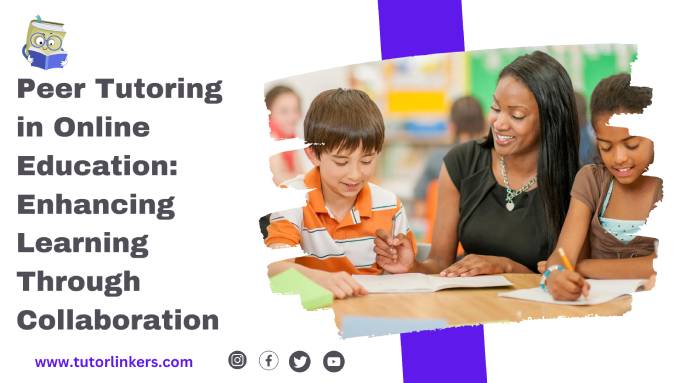Peer Tutoring in Online Education: In the dynamic landscape of online education, peer tutoring emerges as a powerful tool for fostering collaborative learning experiences. As we navigate the complexities of remote learning, the significance of peer-to-peer interaction becomes increasingly evident. This blog explores the multifaceted role of peer tutoring in online education, shedding light on its benefits, challenges, and potential for transformative impact.
Understanding Peer Tutoring
At its core, peer tutoring involves students assisting and supporting one another in their learning journey. This collaborative approach not only enhances academic understanding but also cultivates essential social-emotional and cognitive skills. In online education, peer tutoring takes various forms, ranging from structured peer-led discussions to informal study groups facilitated through digital platforms.
Benefits of Peer Tutoring in Online Education
The advantages of peer tutoring in the online learning environment are manifold. Academically, peer tutoring promotes deeper understanding and retention of course material through active engagement and explanation. Socially, it fosters a sense of community and belonging, enabling students to connect with their peers and develop interpersonal skills. Moreover, cognitively, peer tutoring encourages critical thinking, problem-solving, and metacognitive reflection, empowering students to become more self-directed learners.
| Benefits of Peer Tutoring in Online Education | Details |
|---|---|
| 1. Enhanced Academic Understanding | Peer tutoring allows students to explain concepts to each other in their own words, deepening their understanding of course material through active engagement. |
| 2. Improved Retention of Course Material | Teaching others reinforces learning, helping students retain information better compared to passive study methods. |
| 3. Fostering a Sense of Community | Peer tutoring creates a supportive learning environment where students collaborate, share ideas, and build relationships with their peers. |
| 4. Developing Interpersonal Skills | Collaborating with peers in tutoring sessions enhances communication, teamwork, and empathy, essential skills for success in both academic and professional settings. |
| 5. Encouraging Critical Thinking | Discussing concepts with peers prompts students to analyze information critically, evaluate different perspectives, and formulate informed opinions. |
| 6. Promoting Problem-Solving Abilities | Peer tutoring encourages students to work together to solve problems, fostering creativity, resilience, and adaptability in addressing academic challenges. |
| 7. Cultivating Metacognitive Reflection | Reflecting on their own learning processes and strategies while tutoring peers helps students become more aware of their strengths and areas for improvement. |
| 8. Empowering Self-Directed Learning | Through peer tutoring, students gain autonomy and confidence in their learning, becoming more self-directed and motivated to take ownership of their education. |
Implementing Peer Tutoring in Online Learning Platforms
Integrating peer tutoring into online courses requires careful planning and strategic implementation. Educators can leverage a variety of strategies and technologies to facilitate peer-to-peer interaction, such as discussion forums, collaborative documents, and video conferencing tools. Providing training and support for peer tutors is essential to ensure the effectiveness and success of peer tutoring initiatives, equipping them with the skills and confidence to guide their peers effectively.
| Implementing Peer Tutoring | Details |
|---|---|
| Strategies for Integration | – Curriculum Integration: Incorporate peer tutoring activities seamlessly into the course curriculum, aligning them with learning objectives and topics covered. <br> – Assignment Design: Design assignments and projects that encourage collaboration and peer feedback, fostering peer tutoring interactions. <br> – Scheduling: Establish regular peer tutoring sessions or designated times for peer collaboration to ensure consistency and participation. |
| Utilizing Technology | – Online Platforms: Utilize online learning management systems (LMS) or dedicated peer tutoring platforms to facilitate peer interactions and communication. <br> – Communication Tools: Utilize video conferencing, discussion forums, chat features, and collaborative documents to enable real-time communication and collaboration among peers. <br> – Resource Sharing: Provide access to digital resources, multimedia materials, and interactive tools to support peer tutoring activities and learning. |
| Training and Support for Peer Tutors | – Training Programs: Develop training programs or workshops to equip peer tutors with essential skills such as effective communication, active listening, and providing constructive feedback. <br> – Peer Mentorship: Pair novice peer tutors with experienced mentors or provide ongoing support and guidance from instructors to enhance their effectiveness and confidence. <br> – Feedback Mechanisms: Implement feedback mechanisms for peer tutors to receive feedback from peers, instructors, and learners, enabling continuous improvement and professional development. |
Challenges and Considerations
While peer tutoring offers numerous benefits, it is not without its challenges. Addressing equity and inclusivity is paramount, ensuring that all students have equal access to peer tutoring opportunities regardless of their background or abilities. Managing group dynamics and resolving conflicts may also pose challenges in online peer tutoring sessions, requiring effective communication and mediation skills. Additionally, ensuring quality control and monitoring the effectiveness of peer tutoring programs is essential for continuous improvement and refinement.
Success Stories and Case Studies
Across various online learning platforms and institutions, success stories abound, showcasing the transformative impact of peer tutoring on student engagement, performance, and satisfaction. From virtual study groups to peer-led discussion forums, peer tutoring initiatives have been instrumental in creating vibrant learning communities and fostering a culture of collaboration and support.
Future Directions and Opportunities
Looking ahead, the future of peer tutoring in online education is ripe with possibilities. Innovations in technology and pedagogy hold the potential to further enhance the effectiveness and scalability of peer tutoring initiatives. Collaborative research and partnerships between educators, researchers, and technology developers can drive advancements in peer tutoring practices and expand access to high-quality learning experiences for students worldwide.
Conclusion
In conclusion, peer tutoring stands as a cornerstone of effective online education, enriching learning experiences and empowering students to reach their full potential. By harnessing the power of collaboration and peer support, educators can create vibrant learning communities where students thrive academically, socially, and cognitively. As we embrace the opportunities of online education, let us champion peer tutoring as a catalyst for positive change and innovation in the pursuit of lifelong learning.
Read more: Online Tutoring for Underprivileged Students
FAQ’s
- How can instructors integrate peer tutoring into their online courses effectively?
- Instructors can integrate peer tutoring by designing collaborative assignments, incorporating peer review activities, and setting up structured peer tutoring sessions. It’s essential to align peer tutoring activities with course objectives, provide clear instructions to students, and establish a supportive learning environment where peer interactions are encouraged and valued.
- What technologies are commonly used to facilitate peer tutoring in online learning platforms?
- Online learning platforms often utilize various technologies to support peer tutoring, including video conferencing tools (such as Zoom or Google Meet) for virtual tutoring sessions, discussion forums for asynchronous communication, collaborative documents for group work, and peer assessment tools for providing feedback on assignments. These technologies enable real-time collaboration and communication among peers, enhancing the effectiveness of peer tutoring initiatives.
- How can instructors ensure the quality and effectiveness of peer tutoring programs in online education?
- Instructors can ensure the quality and effectiveness of peer tutoring programs by providing training and support for peer tutors, implementing clear guidelines and expectations for peer interactions, and monitoring student progress and engagement. Incorporating feedback mechanisms, peer evaluations, and regular assessments can also help identify areas for improvement and ensure that peer tutoring initiatives meet learning objectives and student needs effectively.
Ehsan Ali is a seasoned content writer and researcher with a talent for translating complex concepts into clear, engaging content. With a deep understanding of human behavior, societal trends, and technical topics, Ehsan creates insightful and impactful content that resonates with a broad audience. His expertise ensures that each piece is both accessible and compelling, bridging the gap between intricate details and everyday understanding.




